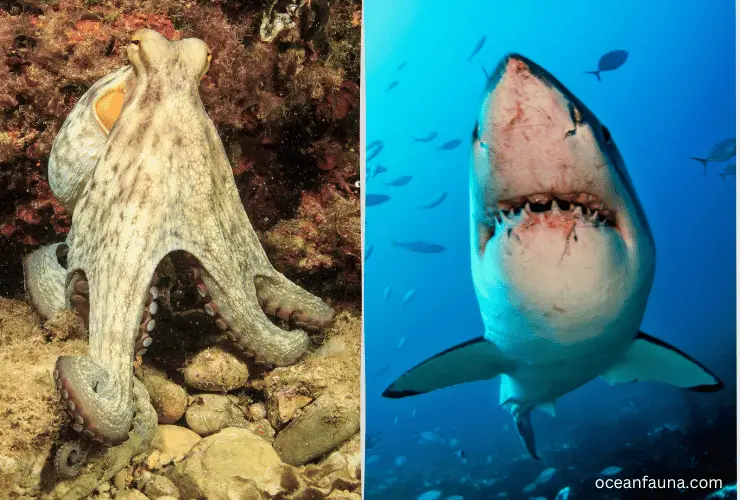Yes, they do. But the fact is that sharks are not the usual diet of an octopus. However, if the situation demands then they might consume sharks.
But in most cases, the Giant pacific octopus catches sharks as their prey. Due to their huge size, it’s easier for them to hunt sharks. Moreover, in hunting sharks, the beaks of an octopus play a crucial role. They put the beaks inside the shark’s skin and inject venom as soon as possible.
This is how they make the first attack towards sharks. Nevertheless, there are more things that involve in this process, for example, how they catch sharks or even sharks eat octopuses, etc. And all these things will be discussed later on in this article.
So, without further ado, let’s get started.
Are Octopuses Afraid of Sharks?
It is not accurate to say that octopuses are “afraid” of sharks, as octopuses do not have emotions in the same way that humans do.
However, octopuses are known to be capable of detecting and avoiding danger, and if an octopus encounters a shark, it may use its ability to escape or defend itself, such as by squirting ink or using its strong arms to fend off the shark.
Whether an octopus would choose to confront or avoid a shark would depend on a number of factors, such as the size and behaviour of the shark and the octopus, and the situation in which they encounter each other.
Do Octopuses Eat Sharks?
Some species of octopuses have the impressive ability to consume even smaller sharks as prey. These creatures use their natural tactics to either ambush their food or actively hunt for it. They prefer to hunt during night-time hours and swiftly attack their prey by wrapping their eight arms around it.
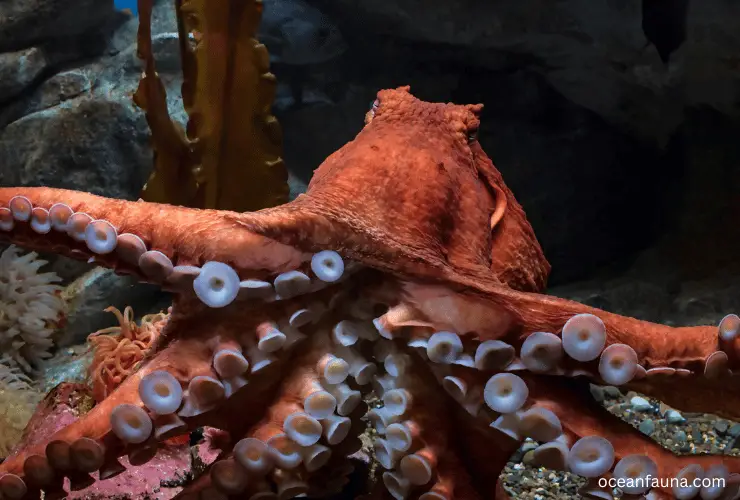
The powerful beak of an octopus can penetrate even the toughest shells and easily make its way through a shark’s skin. The toxicity of the venom used by octopuses varies among species, but when used on smaller sharks, it can quickly stun them.
Additionally, octopuses have been known to insert their legs into the gills of their shark prey, hindering their breathing. This method suffocates the shark, making it easier for the octopus to consume it at its leisure.
Can An Octopus Fight a Shark?
An octopus can defend itself against a shark, but it would be unlikely to win a fight against a shark.
Octopuses are known for their ability to squirt ink, which can be used to confuse and disorient predators, and their strong, flexible arms, which they can use to fend off an attacker.
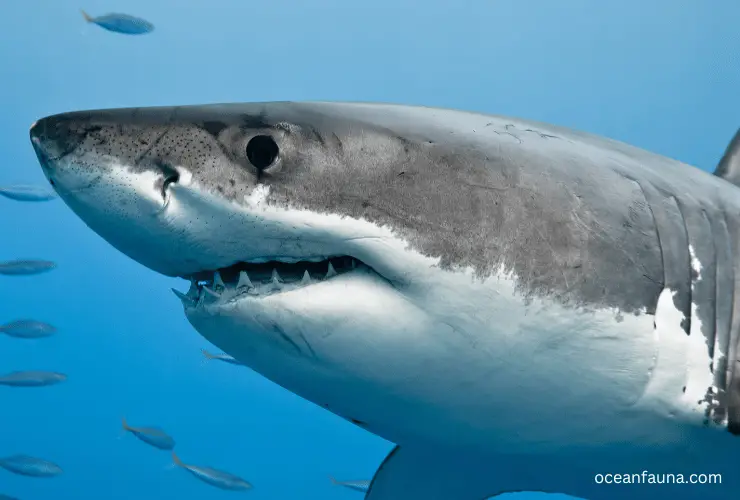
However, most species of shark are larger and stronger than octopuses, and would likely be able to overpower an octopus in a fight.
In some cases, an octopus has been known to kill a smaller shark, but this is relatively rare and would likely depend on a number of factors, such as the size and behaviour of the octopus and shark, and the specific circumstances of their encounter.
How Does an Octopus Catch a Shark?
Octopuses are highly skilled predators that have a variety of adaptations to help them sense and capture their prey. This sense also helps them to catch prey like a shark. They possess sensors in the suction cups on the bottom of their arms that allow them to detect the scent, texture, and taste of potential prey.
This allows them to remain undetected while they creep around the ocean floor, tucking their limbs into tiny spaces in search of food. While octopuses are themselves prey to larger animals such as seals, whales, and huge fish, they are incredibly efficient hunters.
One of the octopus’s most unique abilities is its famed backward swim, which is accomplished by blasting water through a muscular tube on its body known as a siphon.
Additionally, octopuses have exceptional vision, and scientists believe that they hunt by first picturing their surroundings and then investigating the area with their arms. They also have the ability to lunge to transport prey to their mouths because the suckers on their arms are sensitive to taste.
All octopus species are venomous to some degree, and this venom is used in hunting. For example, when the blue-ringed octopus bites its victim, it injects venom that causes paralysis. This venom was specifically evolved to quickly paralyze crabs, which are dangerous prey due to their large, strong claws.
Once prey is captured, it has little chance of escaping the octopus’s grip. The venom can be pumped into the crab or absorbed through its gills. The octopus’s arms may also form a tent-like cage around the crab, concentrating the venom in the water.
Octopus suckers also have a powerful pull that can cause the water within to cavitate. Even small octopuses are capable of ripping open bivalves that refuse to cooperate. Regardless of their size, these cephalopods do not follow the “no puncture” rule. To dig into offenders, an octopus will typically use its sharp beak or spiky radula (a feeding structure that resembles a tongue).
The frequency at which octopuses feed is determined by a number of factors, including the time of day, hunger level, and food availability. Octopuses are generally nocturnal feeders, but some studies suggest that they can hunt and feed throughout the day if the prey is available and they are hungry.
Do Giant Pacific Octopus Eat Sharks?
The giant pacific octopus is considered the most effective shark-eating octopus species. These formidable creatures can be found along the coastal waters of the North Pacific and are known for being the largest known octopus species, with some individuals reaching up to 71 kilograms or 156 pounds in weight.
One of the reasons the giant pacific octopus is so successful at hunting sharks is its impressive size. These octopuses can grow to massive proportions, with arms that can stretch up to 1.8 meters or 6 feet in length. Each arm is covered in suckers, with some individuals having as many as 280 suckers per arm.
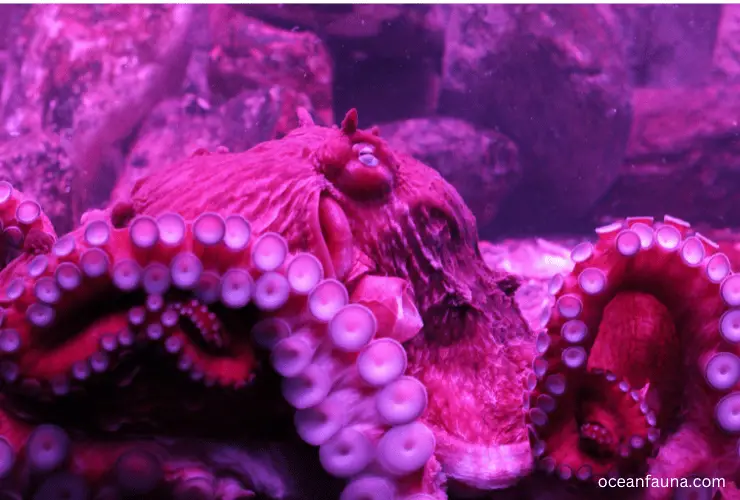
In addition to its size, the giant pacific octopus is also known for its excellent eyesight, which it uses to hunt at night. These creatures are opportunistic feeders and will eat a variety of prey including crabs, shrimp, lobsters, fish, and other octopuses. However, sharks are also known to be on the menu for these octopuses.
In fact, a captive giant pacific octopus was once filmed capturing and eating a spiny dogfish (Squalus acanthias) that was over 1.2 meters or 4 feet in length at the Seattle aquarium. Additionally, wild-caught giant pacific octopuses have been found with the remains of shark species in their stomachs, further demonstrating their ability to catch and eat these large aquatic predators.
Do Sharks Eat Octopuses?
We already found out that octopuses eat sharks. However, sharks can also consume octopuses, but the frequency and choice of such prey vary among different shark species and their habitats.
As apex predators with no natural enemies, sharks have a diverse diet and can eat almost any sea creature they come across. However, individual sharks exhibit differences in their feeding habits, even when presented with similar prey options within the same taxonomic class.
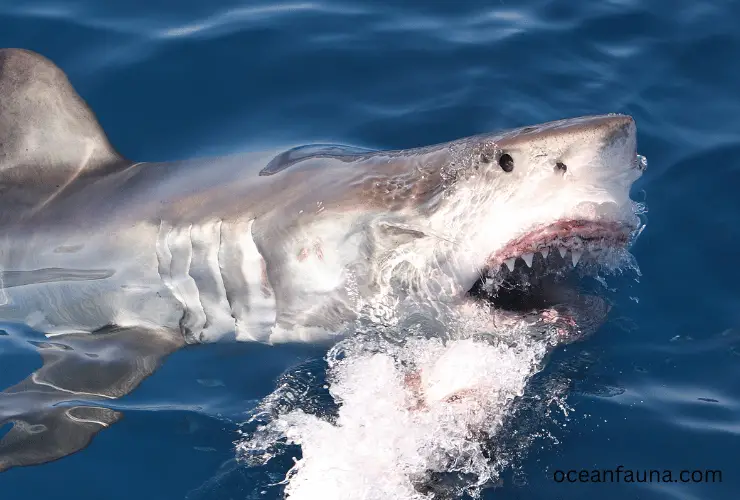
Octopuses belong to the Mollusk phylum, which encompasses a range of shelled organisms including clams and oysters. A shark’s diet, however, is not limited to these creatures and can encompass a wide range of prey based on the shark and its habitat. Sharks can consume anything from tiny oysters to large octopuses or squids.
What Are the Factors That Differentiate a Shark and an Octopus?
When evaluating a potential fight between a shark and an octopus, it is important to consider various factors such as size, speed, senses, physical defences, and combat skills.
Size
Sharks generally have the upper hand as they are larger on average and can reach much larger sizes than octopuses. For example, great white sharks can weigh up to 5,000 lbs and grow to 26ft in length, while the largest octopus ever recorded only weighed 600 lbs and grew to 30ft in length.
Speed and Movement
Compared to octopuses, sharks are faster swimmers. The average shark can swim at speeds between 15mph and 25mph, while the mako shark can reach speeds of up to 45mph. On the other hand, octopuses typically move at less than 5mph and can only swim at burst speeds of 25mph.
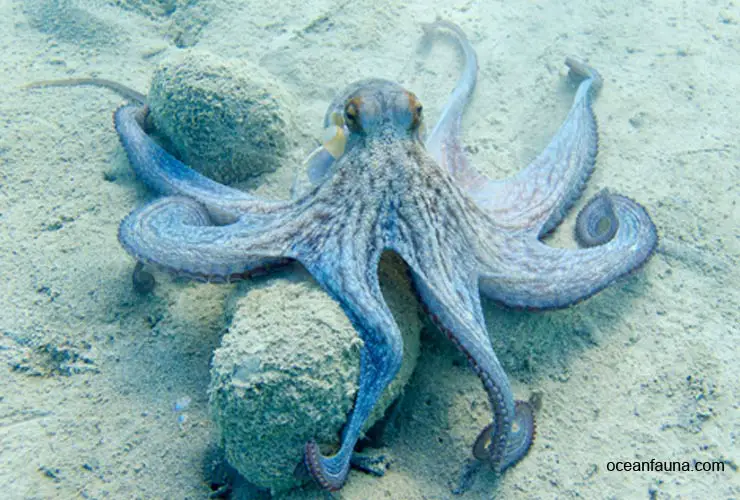
Senses
Sharks have a significant advantage as they have excellent vision, a highly developed sense of smell, and the ability to detect electrical fields in their prey. Octopuses have unique senses, including the ability to sense light throughout their bodies, “smell” through their arms, and hear low frequencies, but their abilities in these areas are not as well understood.
Physical Defences
Octopuses have the advantage as they can change the color and texture of their skin for camouflage and can make some creatures hesitant to attack them due to their venomous or poisonous appearance. Sharks have some protection from their size and speed, as well as their skin.
Combat Skills
Octopuses vary in their approach, with some using venom to overwhelm their opponents, while others latch onto their prey with their tentacles and bite them with sharp beaks. Sharks primarily use biting as their form of attack, using their sharp teeth to tear away large chunks of flesh and exsanguinating their foes.
Overall, while sharks have the advantage in size, speed, and senses, octopuses have better defences and unique combat skills. The outcome of a fight between these two animals is difficult to predict, as the specific species and circumstances would also play a role.
What Types of Other Big Sea Creatures Do Octopuses Consume?
Octopuses come in various sizes and over 300 species have been identified by scientists. They are carnivores, meaning they primarily eat meat.
Their diet typically consists of shrimp, clams, sharks, lobsters, birds, and fish.
However, octopuses also have their own set of predators, such as eels, moray, fish, seals, sea otters, various birds, and sperm whales. To defend themselves, octopuses use tactics like changing skin color, flashing bright displays, squirting ink, hiding in tight spaces, and rapidly swimming away.
Conclusion
In conclusion, while octopuses are not a common prey item for sharks, they are capable of attacking and eating small shark pups if the opportunity arises. However, this is not a common occurrence and does not reflect the typical diet of octopuses, which consists mostly of crustaceans, shellfish, and small fish.

